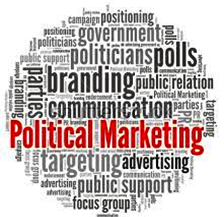Political Marketing: An Election Victory Strategy (Part I)
Elections in Sierra Leone are over and the dust has settled. We have a new government. Let me use this opportunity once again congratulate His Excellency Rtd. Brigadier Julius Maada Bio of the Sierra Leone People’s Party, SLPP, and the people of Sierra Leone. (Photo; Mohamed Sheriff Bah, author)
Several political analysts and commentators have been involved in elections postmortem, citing several things they believe went right or wrong. This piece will attempt to discuss political marketing theory as a strategy for election victory, especially in Sierra Leone.
Political Marketing

While it is safe to think that voting decisions have been purely based on how well the manifesto of each of the candidates align with society’s and individual set of beliefs and values, they are also are based on deep rooted party colour and regional affiliations. In other words, it is far more likely that people tend to vote a candidate based on the outcomes of carefully targeted and optimized political marketing campaigns.
Marketing has traditionally been more applicable to profit-making entities than to not-for-profit entities like political parties. However, Lees-Marshment (2001) argues that political parties can use political marketing to increase their chances of achieving the goal of winning elections and they can alter aspects of their behavior, including policy, membership, leadership, and organizational structure to suit the nature and demands of their market. This is very similar to how businesses employ adaptations, when in new markets, as a strategy to localize and appeal to specific markets. Political parties can do well with their overall campaign strategies if they understood their voters well.
Sometimes voters’ actions are mostly prompted by certain promotional activities of some sorts. External entities may be uncomfortable, but the truth is consuming the marketing of any product, service, or idea is how people make decisions about many things in their everyday lives. From the choice of soft drink to buy, to the clothes people choose to wear and even the mobile phone operator to use, people make and take decisions. Well, this is not entirely a bad thing, especially in a country like Sierra Leone where every decision comes with so many choices. This piece will endeavor to discuss political marketing as the cheapest and most ideal way to win elections in this part of the world.
Meanwhile, we cannot discuss political marketing without an attempt to define the concept.
What Is Political Marketing?
The broad concept of marketing introduced by Levy and Kotler (1969) suggests that in addition to commercial products and services, marketing is also applicable to the marketing of persons, organizations and ideas. Therefore, marketing can be applied to political parties, politicians and political ideologies. This will be termed as political marketing.
Political marketing is a relatively new terminology in mainstream political science. This is why definitions of political marketing have mirrored definition of commercial marketing (Henneberg 2002). Nonetheless, experts in both marketing and political science have made efforts to highlight the fundamental differences between political and commercial marketing (Baines et al. 2003; Henneberg and Ormrod 2013). Thus, it is prudent to develop a definition of political marketing from a political marketing theory point of view.
Shama (1976:766) defines political marketing as “the process by which political candidates and their ideas are directed at voters in order to satisfy their potential needs and thus gain their support for the candidate and ideas in question.”
Henneberg (2002:103) proposes that: “Political marketing seeks to establish, maintain and enhance long-term political relationships at a profit for society, so that the objectives of the individual political actors and organizations involved are met. This is done by mutual exchange and fulfillment of promises.” In commercial marketing, this could be interpreted as relationship marketing. In this definition, two key stakeholders are named: society and political actors (both individuals and organizations).
Simply put, political marketing is the process by which political candidates or parties promote themselves and their parties to voters. This means the effective use of marketing tools, techniques and methods in the political process. Political advertising, celebrity endorsement, involvement of professional consultants and campaign managers, online campaigns, mobile phone canvassing, voter segmentation, micro targeting, branding, and rallies are some of the methods or tools extensively used in political marketing.
Commercial and Political Marketing
As a political marketer, who has studied, lived and worked in Sierra Leone, Ghana, Kenya, Turkey, USA, UK, I know this. Coming from that background, I also know that people, or non-marketers, often think that commercial marketing techniques and strategies do not apply to them. However, while the entity being marketed is different, given the ecosystem in context, there are many parallels between political marketing and the marketing of goods and services, generally. It is important to note that commercial marketing, which refers to the marketing of economic products and services, and political marketing, which relates mainly to marketing of political candidates, have much in common – (1) basic concepts such as sellers, buyers, products, consumers, market segmentation are at the core of each of them, and (2) tools or techniques and media selection. On these grounds, the concept of marketing seems to be quite applicable to the area of political marketing.

Sellers, Products and Buyers: Just like in commercial marketing, political marketing uses three main elements: sellers, products, and buyers. In commercial marketing, marketing is the process through which sellers offer the buyers products and services in return for something of value (usually money). The same process occurs in political marketing, whereby the candidates offer the voters products or ideas such as “economic prosperity, free education and infrastructure” or a “safe society” in return for their votes and support in the campaign period and thereafter.
Consumers: At the core of both commercial and political marketing are the consumers otherwise referred to as voters in political marketing context. Without these consumers or voters, political and commercial marketers do not have a campaign or market. Since both marketers need consumers to survive, the concept of consumer or voter behavior becomes a focal point of commercial and political marketing. Understanding consumer or voter behavior is the pivot around which the success of a market campaign revolves.
By Mohamed Sheriff Bah, MBA Marketing
Stay with Sierra Express Media, for your trusted place in news!
About the Author: Mohamed Sheriff Bah is a Mandela Washington Fellow, a certified Digital and Social Media Marketing professional and an Entrepreneur. He holds an MBA in marketing from Marmara University, Istanbul, Turkey and a B.A honours in Mass Communication from Fourah Bay College.
Follow Mohamed on his blog: https://mohamedsheriff.blogspot.com/
Find him on Limey: Mohamed Sheriff Bah, Facebook: sulaimandara
© 2018, https:. All rights reserved.






